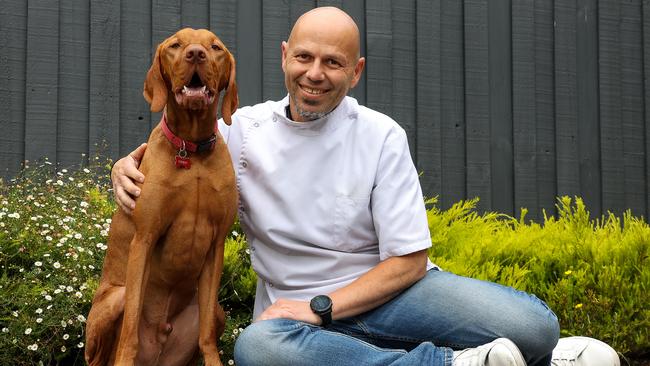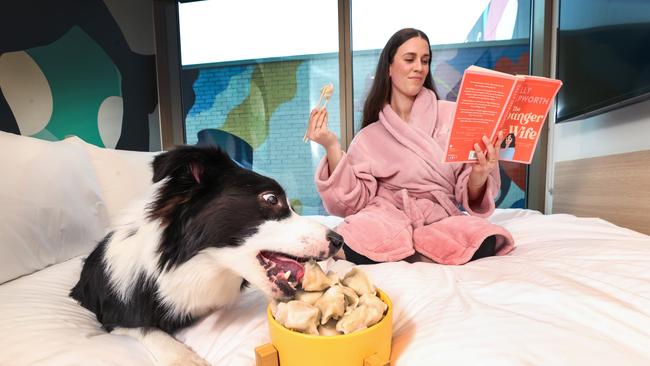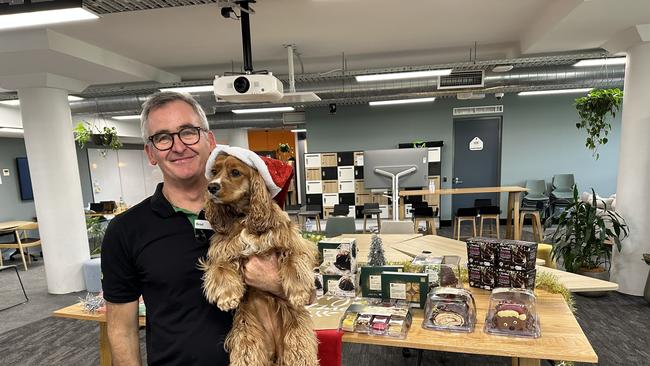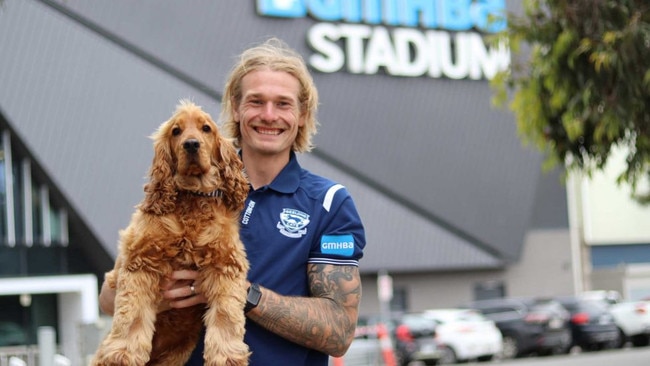Australians pamper pooches like never before and companies want in
From antidepressants to rooms at five-star hotels – the humanisation of pets has exploded, and companies want in.

Business
Don't miss out on the headlines from Business. Followed categories will be added to My News.
Chris Stefanos had worked as a pharmacist for three decades – dispensing medications for all types of illness – when he came across a prescription that left him stumped.
The prescription was not for the customer but for their dog, an early sign of what would become one of the biggest trends of the 2020s: the humanisation of pets.
Pet ownership in Australia has soared from 61 to 69 per cent of households in the past two years, fuelling a new gold rush, with companies from Woolworths and Blackmores to global food giants Mars and Nestle moving to cash in on a market, estimated to be worth $10bn and growing.
And that’s just on specialty products. If veterinary services are included, Australians are spending more than $30bn a year on their dogs and cats.
For this reason, companies are hoping man’s best friend will deliver a bonanza as profits taper on existing revenue streams. And it’s not just about producing fluffy balls or new flavoured treats.
Mr Stefanos, who owns four pharmacies in Melbourne, said most of the animal prescriptions he dispensed were for antidepressants, the same type of medication designed to treat a range of human mental health disorders.
“It kind of mimics humans. Antidepressant use has just exploded in the last five to eight years, so it stands to reason that’s what we are dispensing for pets as well,” Mr Stefanos said, adding he dispenses about 50 prescriptions for animals a month, and had to refresh himself on the regulations when he received his first pet script.
“We’ve got scripts that people keep on file for us where they’re just regularly getting things for their pets. It’s far more common than I imagined.”

Other medications customers are seeking for their pets include eyedrops and anti-inflammatory and anti-allergy treatments.
The line between what is for a pet and what is for human consumption is becoming increasingly blurred as more people pamper their animals – a shift that is not going unnoticed as more companies pivot to cash in.
Last June, Hilton teamed up with Mars Petcare to make their hotels more pet friendly, with 85 per cent of its hotels in the US now accommodating pets.
This shift has also prompted Woolworths to acquire a controlling stake of Petspiration – owner of PETstock – for $586m, representing a multiple of 11-times EV/EBITDA, last month.
Woolworths chief executive Brad Banducci defended the price tag, saying the supermarket chain was not paying “top of the cycle” prices after a pandemic-induced boom in pet ownership, and said the business had plenty of runway for future growth.

Woolworths sees its cent stake in Petspiration – which has 276 stores, 65 clinics and 162 grooming salons – as an opportunity to branch into the $10bn specialty pets sector while also fleshing out a new, larger and more profitable retail ecosystem,
“Firstly, if you look at this group, it has actually had an impressive growth trajectory on the top and bottom line going all the way back to way before Covid, so it has a great growth story behind it,” Mr Banducci said at the time.
“Pets are living longer and leading more rich, enjoyable lives and we don’t see this as a peak (cycle), this trend started many years ago and we expect it to continue for many more years.”
Goldman Sachs analyst Lisa Deng said the Petspiration acquisition – which was funded from the $636m it raised from its selldown in liquor retailer and pubs group Endeavour – made sense.
“We view the announced acquisition of Petspiration Group as an incrementally positive step in the evolution of Woolworths’ ecosystem strategy,” Ms Deng wrote in a note to clients at the time.
“The transition from liquor retail and gaming/hotels into higher growth, and closer synergies with the family shopper pet retail is in line with its strategy of building a reinforcing retail ecosystem.”
Morgans analyst Scott Power said the Petspiration acquisition underscored the importance of the pet category as a growth driver, highlighting that ASX-listed healthcare company Ebos estimated there was about $1bn of potential unaddressed market across Australia and New Zealand.
“The pet market has seen considerable growth, boosted by Covid with increased pet ownership between 2019 and 2021. This is also supported by the structural growth tailwinds in the segment which are not limited to Covid impacts, such as the humanisation of pets,” Mr Power said.
Ebos acquired pet food brand BlackHawk Premium Pet Care for $NZ57.8m ($53.5m) in 2014, and last year opened an $82m pet food factory in Parkes. It also owns other brands, including Masterpet and VitaPet, and appointed former Hill’s Pet Nutrition boss Julie Dillon in late 2021 to run its animal care division, which now generates annual revenue of more than $500m.
“It (Woolworths’ Petspiration acquisition) demonstrates to us the importance of the pet category with the supermarket chains moving into this channel,” Mr Power said, adding he estimated Ebos’s animal care division to deliver medium-term growth of 9 per cent a year.
“Whilst there is no direct impact on Ebos earnings given the existing relationships, it helps reinforce our view that animal care is an important growth driver for Ebos.”
Other companies have spent the past decade building their exposure to the pet category. Vitamins maker Blackmores acquired Pure Animal Wellbeing in 2010 for $2m. The division is now one of Blackmores’ three core brands and includes natural dietary supplements and topical products that are sold in veterinary clinics and specialty stores in Australia, New Zealand and Asia.

Blackmores boss Alastair Symington said the strength of the PAW brand helped fuel a 27.8 per cent leap in Blackmores’ net profit to $30.6m last financial year.
It also launched an advertising blitz for the PAW brand titled “more than human”, which the company said reached 5.5 million pet owners within three months.
A report from Animal Medicines Australia said pet owners spend $3200 per dog and $2100 per cat each year on average. This covers primarily food, veterinary services, and healthcare products and extrapolated across the country, equates to more than $30bn spent in the past year.
Animals Medicines Australia president Lance Williams said policy makers must also consider the needs of companion animals and their owners.
“This should range from rental, strata, and body corporate regulations to animals in public places, transport access and holiday accommodation. The pandemic also showed that pet animal welfare must be explicitly protected as an essential service/activity,” Mr Williams said.
Hybrid and remote working has been cited as driving the rise in pet ownership as more people move to the regions while keeping their big city jobs and finding they now have the lifestyle where they can have a dog, cat or even a horse.

Chris Richards, chief executive of ASX-listed veterinary group Apiam, which owns the Fur Life brand, has built his corporate strategy around this trend. The company has been expanding. Since 2019, it has increased the number of its clinics from 48 to 75.
“We came out last year and said that we were going to double the revenue of our company from $150m to $300m by the end of (the 2024 financial year),” said Mr Richards.
“We’re doing that both by acquisition of strategic clinics as well as through our organic growth program.
“What it looks like for us is we‘ll continue on our acquisition program, probably make between five and 10 acquisitions of large veterinary clinics in the next 12 months. But we’ll also continue to open some new greenfield clinics where there’s a real opportunity
“You probably won’t see us in capital cities but certainly in those regional cities and regional growth corridors – that’s where we see our strength,” he added.
Originally published as Australians pamper pooches like never before and companies want in



